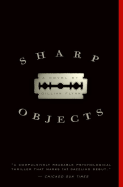
Holy Christ, this book just hit me like a—like some kind of big truck or train or something. I turned down two invitations to sit at home and read this book; I couldn’t be bothered to think about anything else. I carried it to the bathroom with me, I read it walking to and on and from the train, I tripled checked the locks on my doors and stayed up until three in the morning. And then, of course, it was over too soon, and I miss it, like an addiction.
The book is Sharp Objects, by Gillian Flynn, and I'm two years late. It's a murder mystery, the main character is a journalist, on assignment to return to her hometown to report on the murders of two young girls, but the details aren't really that important. I mean, they are, but here's what everyone wants to talk about with this book:
Camille Preaker (the journalist) is a cutter. She has cut words all over her body, save for her face and hands, and a circle in the middle of her back she couldn’t reach. Six-months in recovery, she still jams wood staples into her fingernails and scrapes her palms with any hard edge in sight. She traces words in ballpoint on her forearms, her thighs, until they are raw.
That Camille Preaker is a cutter is important, but what’s more important is that Camille Preaker is fucking real. She has real thoughts and needs and they are not all nice and they are certainly not pretty and she fucks up a lot while dealing with life in a way that is completely true. She drinks too much, she does drugs (with her underage sister), she has unrepentant sex. But she also meets deadlines and pays her bills and takes care of her shit. She is holding her edges together, tenuously. She is full of contradictions, and Gillian Flynn makes no apologies for her.
Gillian Flynn writes about hatred and darkness and she lets her characters be honest. She writes about girls with “serious tempers, like scary-time tempers, like boy tempers.” She writes about the dangerous fury that festers in neglected and children of privileged families, but you don’t really get the feeling she feels too sorry for them (“being conflicted means you can live a shallow life without copping to being a shallow person.”). She presents her characters with all their flaws and complexities and lets them judge themselves.

No comments:
Post a Comment